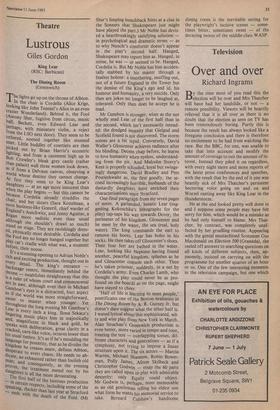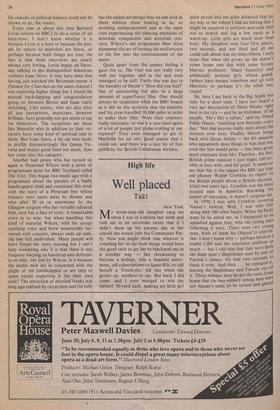Television
Over and over Richard Ingrams By the time most of you read this the -Lielection will be over and Mrs Thatcher will have had her landslide, or not — a remote possibility. Viewers will be heartily relieved that it is all over as there is no doubt that the election as seen on TV has been tremendously boring. Partly this is because the result has always looked like a foregone conclusion and there is therefore no excitement to be had from watching the race. But the BBC, for one, was unable to take that into account and modify the amount of coverage to suit the amount of in- terest. Instead they piled it on regardless, with every night more and more reports of the latest press conferences and speeches, with the result that by the end of it one was heartily sick of Mrs Thatcher's persistent hectoring voice going on and on and Worzel ranting away like King Lear in the thunderstorm.
He at the end looked pretty well done in and I suppose some people may have felt sorry for him, which would be a mistake as he had only himself to blame. Mrs That- cher, by contrast, was completely unaf- fected by her gruelling routine. Appearing with the genial mustachioed Scotsman Gus Macdonald on Election 500 (Granada), she reeled off answers to searching questions on all kinds of different subjects, then, ap- parently, insisted on carrying on with the programme for another quarter of an hour or so. One of the few interesting moments in the television campaign, but one which
for reasons of political balance could not be shown to us, the 'voters.
Every year at about this time Bernard Levin returns to BBC2 to do a series of six interviews. I don't know whether it is because Levin is a bore or because the peo- ple he selects to interview are bores, or perhaps because both things are true; the fact is that these interviews are nearly always very boring. Levin began on Satur- day talking to the distinguished American violinist Isaac Stern. It may have been that having just watched the Betjeman repeat A Passion for Churches on the same channel I was expecting higher things but I found the mutual backslapping and congratulation going on between Bernie and Isaac fairly sickening. Like actors, who are also after all just interpreters, musicians, however brilliant, have generally not got much to say for themselves. The exceptions are those like Menuhin who in addition to their vir- tuosity have some kind of spiritual side to them. But Isaac Stern, a fat cat who looks in profile disconcertingly like Queen Vic- toria and enjoys good food too much, does not come into this category.
Another bad penny who has turned up again is Desmond Wilcox with a series of programmes done for BBC Scotland called The Visit. This began two weeks ago with a programme about the parents of a badly handicapped child and continued this week with the story of a Peruvian boy whose features were eaten away by disease and who after 50 or so operations by the Glasgow surgeon who has virtually adopted him, now has a face of sorts. A remarkable story in its way, but when handling this kind of material Wilcox, with his syrupy soothing voice and brow unnaturally fur- rowed with concern, always ends up mak- ing one feel ambivalent. Many people will have found the story moving but I can't help wondering why it is that there is this frequent harping on handicap and deformi- ty on telly, not just by Wilcox. Is it because the media men are so concerned with the plight of the handicapped or are they to some extent exploiting it for their own ends? The attraction of physical freaks was ong ago realised by circus men and the telly has the added advantage that we can look at them without them looking at us, so avoiding embarrassment and at the same time experiencing the pleasing emotions of armchair compassion and armchair con- cern. Wilcox's old programme Man Alive pioneered the art of turning the misfortunes of the few into the entertainment of the many.
Quite apart from the uneasy feeling it gave rise to, The Visit was not really very well put together and in the end even managed to be dull. Partly this was due to the banality of Dezzie's 'How did you feel?' line of questioning but also to a large amount of superfluous film. One should always be suspicious when the BBC boasts as it did on this occasion that the reporter and his crew travelled 30,000 miles in order to make their film. Were their journeys really necessary, or was it a case once again of a lot of people just globe-trotting at our expense? They even managed to get to Marbella for no very good reason that I could see, and there was a nice bit of free publicity for British Caledonian Airlines.











































 Previous page
Previous page